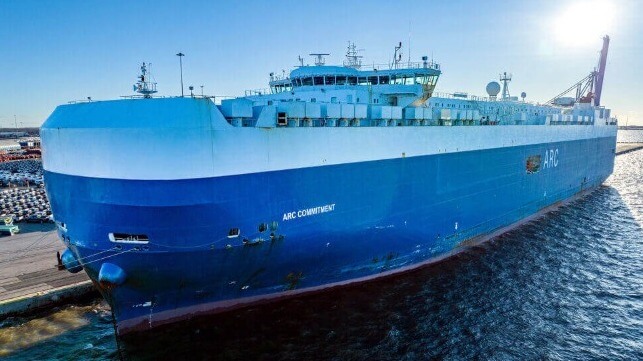Poisonous Stowaway Spiders Cause U.S. Ro/Ro to be Quarantined in Germany

Nearly two weeks after arriving in Bremerhaven, Germany, an American-flagged Ro/Ro used to transport supplies for the U.S. government remains under quarantine after an unwelcome stowaway was found aboard. The Arc Commitment (31,143 dwt) is reporting an infestation of the poisonous black widow spider discovered on two decks of the vehicle transport when it arrived in Europe earlier in the month.
According to port officials in Bremerhaven, the master of the vessel reported a possible infestation before the vessel docked on July 17 arriving from Poland. While in Gdansk, the vessel had been treated for spiders, but a Bremerhaven official said they apparently did not kill all of them.
As a precaution, German officials ordered an inspection of the vehicle transport when it arrived. According to media reports, when they moved a container, a spider was seen scurrying away. The vessel was put into lockdown with two decks where they believe the spiders are were sealed. Reports said the crew is safe and has remained aboard the vessel because they are isolated from the cargo areas and the two decks can be sealed airtight.
Teams that were brought aboard have been able to capture one of the spiders which was sent off to a lab to confirm its species. The black widow spider is venomous and its bites cause illness and extreme pain to humans and in some cases with children, the elderly, or the infirm, a bit can actually be deadly.
The vessel which was built in 2011 was transferred to the U.S. flag at the end of 2021 and entered into the Maritime Security Program (MSP). The privately-owned vessels provide sealift capacity and support to the military and other federal agencies. American Roll-On Roll-Off Carrier Group, a division of Wallenius Wilhelmsen, operates the vessel as part of a fleet for the MSP and highlights it can transport wheeled vehicles, helicopters, and other high and heavy project cargoes.
Wallenius Wilhelmsen said that it suspects the poisonous spiders got aboard while the Arc Commitment was loading in Beaumont, Texas. Media reports highlight it is a race against time to capture the spiders because a female can lay up to 200 eggs at a time.
German officials ordered the vessel transferred to a remote part of the port. Starting last Friday, July 26, exterminators with special equipment were beginning to fumigate the vessel. In the second stage, they will use specialized equipment to vacuum up the spiders. Only after the vessel has been certified as cleaned will they permit cargo unloading to resume. Reports are the fumigation and cleaning process could take up to three weeks.
No comments:
Post a Comment